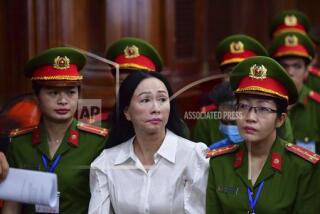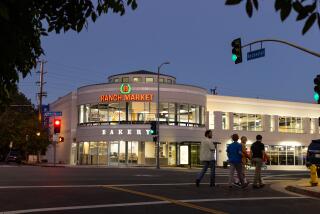East West surges into banking mainstream
City National Corp. may be the “Tiffany & Co. of the banking business,” as one analyst put it, but the gleam of another Los Angeles area bank has caught the eye of Wall Street.
East West Bancorp, a Chinese American dynamo headed by the immigrant son of a Hong Kong bus driver, surged ahead of City National in stock market value for the first time two weeks ago after reporting earnings of $164.6 million last year, about 25% higher than City National’s profit.
The accomplishment underscores the rich cultural mix of the Los Angeles area and cements East West’s reputation as the most mainstream among dozens of Asian American banks that have sprung up in the region.
“It shows the growing impact of Chinese Americans as part of the fabric of the country,” said Wei Li, an Arizona State University professor who co-wrote a 2001 academic study of Chinese “ethnobanks” in L.A. At that time, Li said, East West already was on the fast track to the mainstream.
“But the pace and scope of the changes are beyond [my] expectations,” she said.
East West’s market capitalization — essentially the stock price multiplied by the number of its shares — was $3.3 billion at the close of trading Tuesday, compared with City National’s $3.1 billion. (East West shares fell 9 cents Tuesday to $22.59, while City National dropped 33 cents to $59.54.)
“City National is a very, very good bank,” East West Chief Executive Dominic Ng said. “We always looked at them as the leader in Los Angeles. So when we have earnings that are 20% or 30% ahead of them, we have to look at ourselves and say: ‘That’s pretty good.’ ”
Analysts said East West, based in Pasadena, was transformed by its November 2009 acquisition of San Francisco’s failed United Commercial Bank, which doubled its size to about $20 billion in assets.
The combined bank has proved highly profitable and is by far the largest bank with a core clientele of ethnic Chinese, though Ng has said his strategy was to meet not only the Asian community’s cultural and financial needs, but those of Western customers as well.
As it has commonly done after seizing failed banks in recent years, the Federal Deposit Insurance Corp. persuaded East West to take on United Commercial’s bad loans, with the FDIC shouldering most of the losses. Last June, East West acquired a smaller failed bank that also had focused on Chinese Americans, Washington First International Bank in Seattle, in a similar loss-sharing deal.
That cushion has helped the bank reduce nonpaying loans to an enviable rate of less than 1% while leaving ample capital in the vaults. That in turn has enabled East West to increase commercial lending and international trade financing while other banks were still focused on cleaning up their own loan portfolios.
With three branches in China, East West also is poised to benefit from any increases in Chinese trade and investment that President Obama promoted last month during meetings in Washington with Chinese leader Hu Jintao.
Chinese regulators in December lifted restrictions they had placed on East West’s subsidiary in China during the financial crisis, Ng said.
“For the last 19 years, we’ve been saying that we aspire to be the financial bridge between the East and West,” Ng said. “So the U.S.-China trade, the U.S.-China cross-border investment, those are the type of activities that we are most interested in.”
Trade financing makes up about a third of East West’s commercial and industrial loans, a book which has impressed analysts by growing $287 million, or 17%, to $2 billion at the end of December from three months earlier. Year over year, commercial and industrial loans were up 32%.
Such loans for business operations are regarded as more stable than real estate lending, which landed banks in trouble during the financial crisis. East West provides them to businesses that open sizable demand deposit accounts — a source of no-cost funds that has been a huge strength for City National over the years.
“East West Bank has changed remarkably over the past couple of years, both through its own efforts to reform its business and due to the two FDIC deals that greatly increased its size,” said Aaron J. Deer, a Sandler O’Neill bank analyst in San Francisco.
Deer said he knows of no other medium-size bank that has benefited as much from government assistance in taking over failed banks.
In 2008, with the banking crisis at its peak, East West needed all the help it could get. The bank was “in intensive care,” as Ng put it, because of huge losses from construction loans and commercial mortgages. The bank reported a loss of nearly $50 million that year, while City National managed a profit of $105 million.
Moving faster than many banks with similar problems, East West assembled a team to assess the damage and quickly modify or liquidate troubled loans to salvage what they could.
By late 2009, when United Commercial was about to go under, Ng was able to raise $500 million in new investment to complete that acquisition and beef up its capital cushion against losses.
Ng said his loan workout crew, with skills honed by dealing with East West’s problems, has kept the losses on United Commercial loans to about two-thirds of what he and regulators had expected.
City National hasn’t slowed down, either. The Los Angeles bank also raised new capital — more than $300 million over the last two years — and acquired small failed banks in La Jolla, San Diego and Las Vegas in government-assisted deals. But, unlike East-West, its growth has been mainly organic. City National’s chief executive, Russell Goldsmith, declined to comment for this report.
City National still holds a slight edge in loans and other assets — $21.4 billion to East West’s $20.7 billion — as well as in deposits — $18.2 billion to $15.6 billion. Both banks have repaid the government funds that beefed up their capital during the financial crisis. Both said they have emerged in the post-bailout world stronger than before.
The $37 billion that wealthy individuals and institutions have entrusted to City National for management sets it apart from most medium-size banks.
East West, by contrast, was founded in Chinatown in 1972 as a savings and loan to provide home loans to Chinese Americans. Mainstream banks then welcomed deposits from the ethnic Chinese community but still could make it hard for them to get loans, Li said.
As Asian economies boomed and wealthy and professional Chinese immigrated to California, she said, East West financed its new customers’ investments in commercial real estate, while also increasing its international trade business and mainstream U.S. lending.
There’s more expansion to come, Ng said, thanks in large part to the $321 million provided by the FDIC by the end of last year to offset losses from United Commercial loans and $10 million in Washington First International losses.
“We should be able to do pretty good going forward,” he said. “The trend is on our side.”







